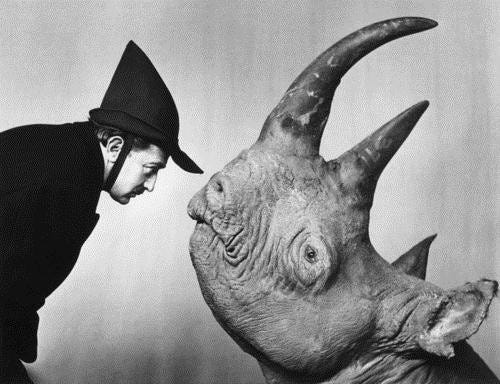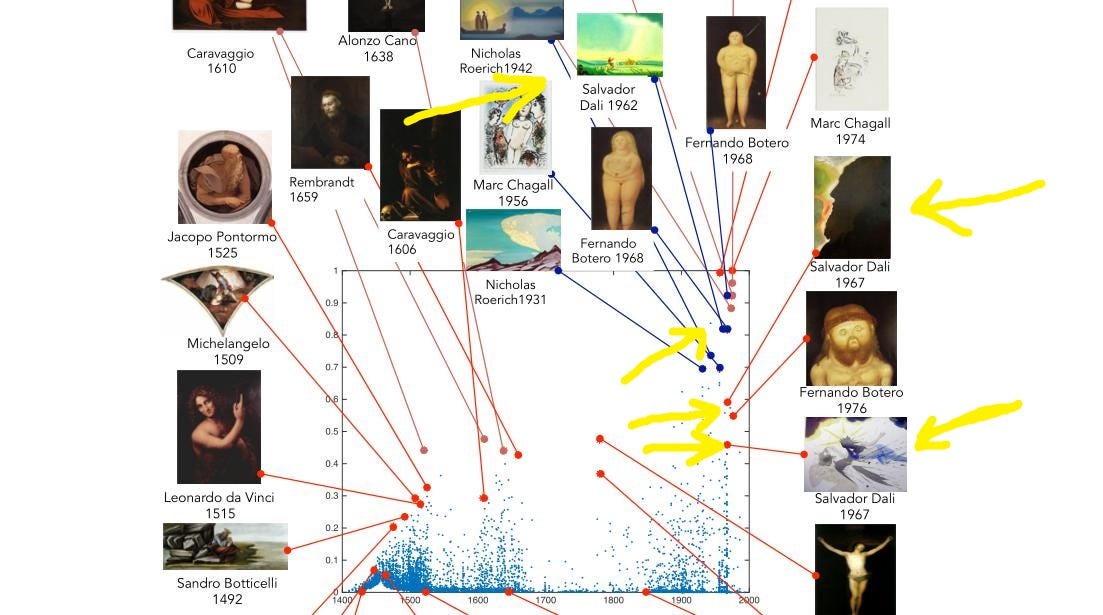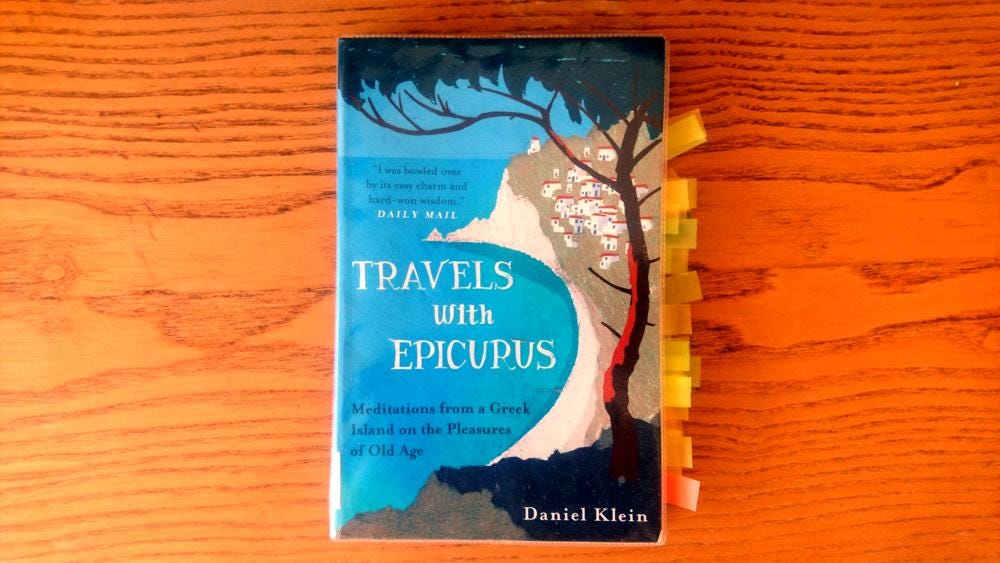Dispellcasting [🇩🇨]
This week: Salvador Dalí, Epicurus and Marcel Proust...
Happy Friday!
And a warm welcome to the weekend. When someone told me it was a Bank Holiday today I vaguely wondered whether we were going one more time round Easter again. Isolation can feel like that, eh?
Here’s your table of contents this week:
✒️ ‘Sleeping Without Sleeping’: How To Create Like Salvador Dalí
📚 Travels with Epicurus by Daniel Klein
‘Sleeping Without Sleeping’

This newsletter is a little later than usual because I spent the whole morning working hard to finish a Medium article on how to use waking dreams for creativity.
When I started, I thought it’d take no more than an hour to update an old blog post. But after re-reading the text, I realised this was a much bigger—and much more interesting story than the one I wrote in 2010.
So eight hours of research, writing and editing later…
How To Create Like Salvador Dalí
Salvador Dalí was one of the great artists of the twentieth century. I can’t show you any of his paintings here because that’d be copyright infringement, but the chances are high that you’ve boggled at his surrealist melting clocks, elephants on stilts and quite possibly his lobster telephone. His work sells for millions.
Dalí’s paintings and sculptures are considered some of the most creative ever produced. If that sounds like an assertion, then at least it’s one supported by a computer algorithm.
In 2015, Ahmed Elgamma and Babak Saleh from Rutgers University published a ‘computational framework for assessing the creativity of creative products’ that ranked thousands of paintings according to their originality and influence. Dalí comes top of the charts, as this graph shows (stupid yellow arrows are my own):

Above: Creativity scores for 5256 religious paintings from the Wikiart dataset (AD 1410–1993), emphasizing originality in computing the creativity sores. The horizontal axis is the year the painting was created and the vertical axis is the scaled creativity score. (Adapted from Elgammal and Saleh, 2015)
Okay, okay, you get the picture: Dalí was an insanely creative chap. But where did he get his ideas from? And, more to the point, could little old you steal his secrets?
In reverse order, the answers are ‘yes’ and ‘the humble micro nap’…
~
The rest of the story, including Dalí’s famous ‘slumber with a key’ technique, is found behind the Medium paywall—but you, my dear friends, can read for free using this link.
This is all a bit of an experiment, an attempt to find advertising-free ways of funding my writing. I’d be delighted if you want to read, enjoy, ‘clap’ and share.
‘The dispelling of an error gives us an additional sense’
I’m currently listening to Marcel Proust’s In Search of Lost Time, an audiobook almost two days in the listening.
This massive work is most famous for the madeleine scene of involuntary memory, but it’s full of observations of the human condition.
When I heard this passage last night, I had to copy it down and share it here:
Until that moment I had been, in the presence of M. de Charlus, in the position of an absent-minded man who, standing before a pregnant woman whose distended outline he has failed to remark, persists, while she smilingly reiterates: “Yes, I am a little tired just now,” in asking her indiscreetly: “Why, what is the matter with you?” But let some one say to him: “She is expecting a child,” suddenly he catches sight of her abdomen and ceases to see anything else. It is the explanation that opens our eyes; the dispelling of an error gives us an additional sense.
You download the whole book, courtesy of Centaur Editions and the English translators C. K. Scott Moncrieff and Sydney Schiff on archive.org.
📚 Travels with Epicurus by Daniel Klein

Ignore the title: this is a short book on ageing, based on Daniel Klein’s own experience and his reading of not only Epicurus but many different philosophers, ancient and modern.
The themes range over expansive territory: philosophical fulfilment, time and worry, solitary reflection, existential authenticity, metaphysics, Stoicism and old old age, spirituality, friendship, death, boredom, play, idleness, autobiography and memory, wistfulness, romance, marriage, depression, risk-taking, rage, and suicide or euthanasia.
In this new Books Make Books review, I go into detail on some of the neuroscience around wisdom: that wonderful intellectual quality that somehow increases as we age. Plus I round up some of the best of Epicurus, including this gem:
Before you eat or drink anything, carefully consider with whom you eat or drink rather than what you eat or drink, because eating without a friend is the life of the lion or the wolf.
Can’t even…
These three delights have kept me warm through the week.
1. I’m gonna say it: Zoom
Yeah, I know about the security flaws, but as well as hooking me up with pub quizzes galore, Zoom connected me with family flung out all over the world last Sunday. We’ve met up in person once in the last couple of decades; now we’ve got plans to meet again online in a month.
2. Sensible World of Soccer… 2020
After listening to Quickly Kevin’s interview with game developer Jon Hare, I had to look up to see how teenage timesink Sensible World of Soccer was faring. I wasn’t expecting to find a vibrant community bringing the game, first published in 1994, into the twenties. I can reveal that SWOS is as much of a timesink as it was 26 years ago.
3. Riding for speed
The long evenings mean I can do a full day’s work, a full afternoon’s reading and still have time for a sundown cycle. On Tuesday I rode hard and fast to Poole and back. I was buzzing for the rest of the day.
Cycling quickly is simply a matter of increasing the frequency with which you pump your legs: your muscles exert themselves in exactly the same way, only faster. Of course, changing direction doesn’t involve the legs at all. Injuries at speed are possible, of course, but they’re unlikely to involve muscle tears.
Running quickly is a different beast altogether: runners have a tendency to lengthen their stride when sprinting, recruiting different muscles. Changing direction is entirely dependent on the feet and legs. Muscle tears at speed are common.
The two differences between the sports mean that, when I want to work hard, I should cycle.
Full marks…
1. For getting the word out about conditions in Greek refugee camps under Covid-19
This short film was made by my friend Alex King—nice one!
2. Thighs of Steel for making the best of a bad show
Thighs of Steel won’t be cycling to Athens this year—we’re going one better.
Starting on 23 May, you’re invited to help us walk, run, cycle, roll, bounce, jump or juggle 24,901 miles in 40 days, while raising money for refugees hit by Covid-19.
I’ll slap signup details into next week’s email…
3. For down time
As sleep researcher Sara Mednick explains, an afternoon nap is as restorative as a full night’s sleep. She also proposes that, for our productivity and health, we should not only take every Wednesday afternoon off work, but also take unlimited holiday, ad libitum. I wonder what she thinks of our enforced furlough?
Any more for any more?
Our stories for Series 4 of Foiled have been given the green light. We still don’t know when they’ll be recorded, but I’ll be sure to let you know. In the meantime, you can catch up on the first three series.
Do you remember me saying a few weeks ago that I was listening to all 1,105 tracks in my Electronic/Dance genre? Well, my ears have finally returned to the beginning. An appropriate time to sign off, I think.
Much love,
dc:
CREDITS
David Charles wrote this newsletter. He publishes another newsletter about reading called Books Make Books. David is co-writer of BBC Radio Wales sitcom Foiled, and writes for The Bike Project, Forests News, Global Landscape Forum, Elevate and Thighs of Steel. He also edits books about adventure, activism and more. Reply to this email, or delve into the archive on davidcharles.info. Thank you for reading!
Unlock the commons for £30
These free weekly newsletters are currently 1.6 percent funded. You can unlock the commons for everyone by becoming a paying subscriber for £30 a year. Thank you.

